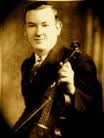Annotation:Luck Penny (The)
X:1 T:Luck Penny, The M:6/8 L:1/8 R:Jig S:O'Neill - Dance Music of Ireland: 1001 Gems (1907), No. 290 Z:AK/Fiddler's Companion K:G G/A/|BAG AGF|DGE FGA|BAG Bcd|cAG F2 d/c/| BAG AGF|GBd gag|fed gdB|cAF G2:| |: d | dgf gfg | abg fed | bag afd | def g2a | bag agf | gbg fed | def gdB | cAF G2 :| |: B/c/|dBG GFG | BGB dBG | cAF FEF | AFA cAF | dBG GFG|gbg fed|def gdB|cAF G2:|]
LUCK PENNY, THE ("An Tuilceanac" or "An Dúthracht"). AKA - "The Luckpenny," "The Lucky Penny, "Ragan's Jig." Irish, Double Jig. G Major. Standard tuning (fiddle). AABBC (Breathnach, Cranitch): AABBCC (O'Neill, Taylor): AABBCC' (Kennedy, Mulvihill). The 'lucky penny' was the extra penny paid for good-will on the price of animals at rural livestock fairs in Ireland. It is mentioned in this excerpt from an account of Glenties Harvest Fair written and published in 1972 by the late Joe Campbell, Glenties:
The tune was recorded under the title "Ragan's Jig" in 1929 by Chicago uilleann piper Tom Ennis.Around 8:00 AM business was in full swing, and what a din. The lowing of cattle, the bleating of sheep, the barking of dogs, the neighing of horses, the grunting and squealing of pigs, but above all, the shouting of drovers and the "bualadh Bhos" of the buyers and sellers trying to strike a bargain.
"How much for the "oul mincher"", one dealer would ask.
"Go along ye bligard" would come the quick reply. "How dar' ye call my two-year-oul springing heifer an oul mincher."
"She hasn't a tooth in her head", would come the retort.
"Faith, then ye haven't so many in yer own gob", would come the reply.
And so it went on until around noon when all bargains were finished and buyers and sellers made their way to the main street and to one or other of the dozen odd pubs then in the town to settle their accounts and to squabble further over the "lucky-penny" that each dealer had to receive before a bargain was complete.


